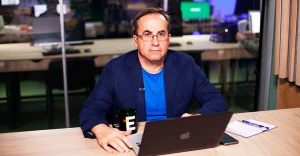
NATO summit results shatter Russian narratives: expert analysis on implications for Russia
Military expert Oleksandr Kovalenko says the NATO Jubilee Summit divided the Russian community: some condemned empty promises to Ukraine, while others were alarmed
Oleksandr Kovalenko, military and political observer, analyzed Russia's response to the NATO summit's results in an article published as part of a joint project of OBOZ.UA and the Information Resistance group.
According to Kovalenko, the current summit was supposed to mark the 75th anniversary of the North Atlantic Alliance, but instead, the main focus was on the war in Ukraine and Western unity, rather than reflections on past achievements and future prospects.
Few Russian "experts" managed to review the summit's final declaration, and those who did noted that it was the most stringent and uncompromising document with far-reaching consequences for Russia (and beyond). Moreover, a whole section was dedicated to the situation in a specific country.
Chapter 15, in particular, has left analytically minded Russians in a state of persistent depression.
Chapter 15
The section discusses the need to establish a NATO Security Assistance and Training Unit for Ukraine (NSATU).
Kovalenko explains that this agency will organize training for Ukrainian military personnel and facilitate military-technical cooperation between NATO countries and Ukraine. Its operations will be structured according to international law, ensuring it cannot be considered a "party to the conflict," nor can any NATO member country. Therefore, any claims to the contrary by Russian officials will have no legal standing and will be aimed solely at domestic audiences.
Moreover, a Joint Analysis, Training, and Education Center (JATEC) will be established as part of this initiative. JATEC will analyze combat operations, model various scenarios, and develop optimal tactics and strategies for both NATO and Ukrainian defense forces.
“All of this points to long-term plans for NATO's cooperation with Ukraine in areas that the Alliance has never paid so much attention to with any other country. Most importantly, it completely destroys the Russian propaganda narrative that the West is tired of the war in Ukraine,” military expert emphasized.
Chapter 3
Kovalenko notes that since 2014, Russia has often been labeled a terrorist state in Ukraine's information space, with its actions equated to terrorism. Since 2022, Russia can be fully classified as a war criminal, which is a more severe category, yet the terrorist theme remains relevant.
“Section 3 of the declaration refers to the international community's response to global terror. I would note that most NATO declarations have traditionally contained a section on combating international terrorism, but this is probably the first declaration to mention Russia along with terrorism as interrelated threats. This may subsequently lead to a broader interpretation, or even to the open recognition of Russia as a terrorist state,” he said.
Budget
According to Kovalenko, the declaration indicates a budget of €40 billion for military assistance to Ukraine in 2025. This demonstrates a commitment to stable and systematic support, rather than fatigue or a desire to force Ukraine into a premature peace.
While the West maintains consistent and systematic actions, Russia does not. Russia is acutely aware that as Soviet equipment depots are depleted, their ability to compensate for monthly losses will diminish, eventually resulting in a deficit. Meanwhile, supplies to Ukraine will continue.
This awareness of depleting mechanized resources is pushing Russia to act with increasing desperation, a fact that Ukraine's partners clearly recognize.
“The NATO Jubilee Summit may not have seemed sensational at first glance, but that’s only if you don’t delve into the details. Through the meetings held and the documents signed, this event laid a solid foundation for cooperation with Ukraine, which will undoubtedly become a member of the Alliance after its victory over Russia. NATO will steadfastly support Ukraine in its fight against the aggressor for this victory.
The expansion of cooperation, stable financial support, the declaration of the unwavering stance on not recognizing temporarily occupied Ukrainian territories as Russian, and the initial diplomatic acknowledgment of Russia as a terrorist state significantly disrupted the Russian media scene. And it’s clear why,” summarized Kovalenko.
- News













































